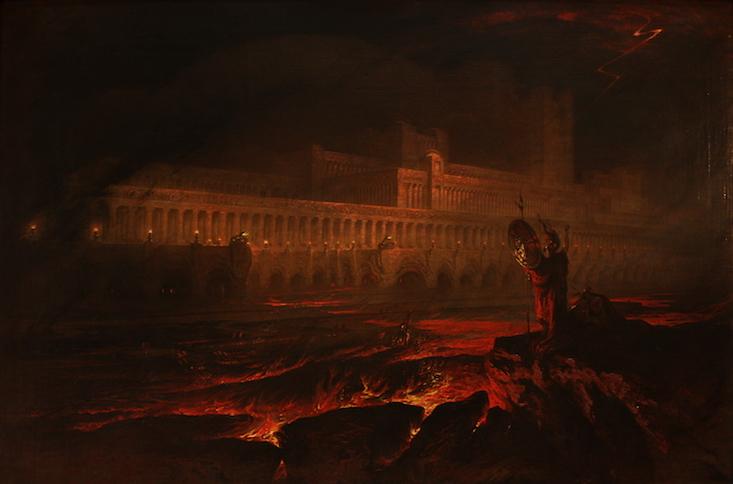Of man’s first disobedience, and the fruit of that forbidden tree,” John Basinger said aloud to himself, as he walked on a treadmill. “Of man’s first disobedience…” In 1992, at the age of 58, Basinger decided to memorize Paradise Lost, John Milton’s epic poem, as a form of mental activity while he was working out at the gym. An actor, he’d memorized shorter poems before, and he wanted to see how much of the epic he could remember. “As I finished each book,” he wrote, “I began to perform it and keep it alive in repertory while committing the next to memory.”
The twelve books of Paradise Lost contain over 60,000 words; it took Basinger about 3,000 hours to learn them by rote. He did so by reciting the piece, line-by-line out loud, for about an hour a day for nine years. When he memorized all 12 books, in 2001, Basinger performed the masterpiece in a live recital that lasted three days. Since then, he’s performed smaller sections for various audiences, eventually attracting the attention of John Seamon, a psychologist at Wesleyan University, in Connecticut. In 2008, “He recited for an hour in the Wesleyan library,” says Seamon. “He’d given out copies of Milton’s book so we could follow along. At the end of the talk I introduced myself and said ‘I’d love to study your memory.’” Basinger agreed, and so Seamon devised a test.
Then 74, Basinger came into the lab to perform a series of cued recall tests. Scientists read two successive lines from each of the poem’s 12 books and then asked Basinger to recall the next 10 lines. The results, published in Memory in 2010, were surprising: Despite the amount of elapsed time since his memorization process, Basinger’s recall was, overall, word-perfect 88 percent of the time. When he was prompted with lines that opened one of the 12 books, his accuracy increased to 98 percent.
Seamon wondered how he might explain this performance, and realized deliberate practice theory could be useful. Although it was “formulated to account for elite performance in chess, music, and sports, it provides a reasonable basis for interpreting JB’s procedure for memorising Paradise Lost,” says Seamon. “He too, in daily short sessions, devoted thousands of hours of study over a period of years to achieve his mastery of Milton.” But Basinger didn’t just remember the words; it would be a mistake, says Seamon, to interpret Basinger’s performance as “simply a remarkable demonstration of brute force, rote memorisation.”
In order to memorize the epic poem, he spent a lot of time repeatedly analyzing its meaning and structure. Acting researchers emphasize this strategy, Seamon notes: “Deep encoding requires actors to attend to the exact wording of lines, and it is the focus on exact wording to gain an understanding of the characters that yields verbatim memory, instead of merely the retention of gist.”
Deep encoding involves making “complex semantic judgments” during a given task, as opposed to “shallow” encoding, which typically consists of just perceptual judgments—like determining the color or size of words—that “result in significantly poorer memory performance,” say David Thomson, a psychologist at the University of Waterloo, and colleagues. Actors like Basinger use deep encoding to give “honest, spontaneous performances, ones that focus on communicating the meanings underlying the literal words,” according to psychologists Helga and Tony Noice. “Indeed, when actors do mention memory,” they write, “it is usually within the context of forgetting the lines until they are needed to communicate the feeling of the moment.” Basinger, Seamon says, “really got into the story, what Milton was trying to convey.” Noice and Noice suggest that this would aid his recall: “Bodily action and emotional response, in addition to semantic analysis, can enhance human memory.”

The books describe the Biblical story of the fall of man—the temptation of Eve by Satan then her and Adam’s expulsion from the Garden of Eden—as well as the prior civil war between God and the rebellious angels, led by Satan. Milton’s Paradise Lost, said the 18th century writer and critic Samuel Johnson, demonstrates “his peculiar power to astonish”—especially in his portrayal of Satan as a heroic figure. “There is much to be gained from an aesthetic point of view by making evil characters complex, glamorous, and persuasive, and to do so without changing what they are,” says Gordon Teskey, an English professor at Harvard. “The Greeks taught Milton to make a character majestic in evil without diminishing the evil of evil.” (Milton’s purpose, he writes in Book I, is to “justify the ways of God to men.”) “During the incessant repetition of Milton’s words, I really began to listen to them,” says Basinger, “and every now and then as the whole poem began to take shape in my mind, an insight would come, an understanding, a delicious possibility.”
Nothing in Basinger’s tests suggested that his memory was otherwise irregular or exceptional. “His memory for everyday tasks appears entirely normal for someone his age,” Seamon says. “He still forgets where he puts his keys.” For those of us who struggle to remember to-do lists, it’s encouraging to know: “Our findings are in agreement with other research on world-class memory performers,” Seamon says, “which indicates that exceptional memorizers are made, not born.”
For his part, Basinger says his years of effort have let him explore Paradise Lost as if it were a physical space. “As a cathedral I carry around in my mind,” he says, “a place that I can enter and walk around at will.”
Lois Parshley is a freelance journalist. Follow her on Twitter @Loisparshley.
Lead photograph by Felipe Gabaldón via Flickr.






























